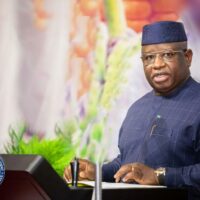Femi Adesina: A Passage to India
Femi Adesina: A Passage to India
Saturday, October 31, 2015 10:25 am
Modi backed his position with statistics. In the past few years, trade between Africa and India has more than doubled to over $70 billion. India is now a major source of business investment in Africa, and 34 African countries enjoy duty free access to the Indian market. The country has equally committed $7.4 billion in concessional credit and $1.2 billion in grants since the first summit held in 2008.
In the immediate future, according to Modi, concessional credit of $10 billion would be given to Africa within five years, while grant assistance will total $600 million.
The presidents spoke one after the other. Trust Robert Mugabe, who spoke in his capacities as Zimbabwean president and chairman of African Union, he used the opportunity to fire darts at the West.

“A Passage to India’ is the title of a literature text I read in the university some 32 years ago. It was a 1924 novel by the English writer, E.M Forster. The book was on the struggle for Indian independence from British colonial rule, and the book is today regarded as one of the 100 Great Works of the 20th Century by the Modern Library, while Time Magazine also includes it in its ‘All Time 100 Novels’ list.
A Passage to India. That was what I embarked on, alongside my principal, President Muhammadu Buhari, who was billed to attend the 3rd India-Africa Forum Summit, scheduled for New Delhi, the Indian capital, between October 27 and 30,2015.”
According to him, one-third of the world’s population must be respected, therefore, the United Nations must become the United Equal Nations, with its Charter amended.
Chairperson of the AU Commission, Dr Nkosazana Dlamini Zuma, submitted that Africa and India could no longer be rationally excluded from the permanent seat of the UN Security Council, a position supported by almost all the presidents.
One thread ran through the presentation of nearly all the African leaders. This was a good time to promote cooperation between Africa and India. South-south cooperation must not just be political slogan, but an opportunity for the countries to to meet their growing challenges.
“Africa needs mutual partnerships leading to development, rather than aids,” submitted King Mohammed VI of Morocco.
Idris Deby Itno of Chad said India and Africa had had mutual exchanges since time immemorial, stressing that partnership will help achieve the Sustainable Development Goals (SDGs).
President Muhammadu Buhari said India and most African countries have similar historical experiences, and the summit was an opportunity to review what had been achieved since 2008, stressing:”India and Africa must develop new spirit of solidarity to confront challenges.”
He equally brought the message home, saying:”as a government, we have demonstrated our strong determination to change the direction and content of governance, including the management of our resources through accountability, transparency, and result-orientation in governance. We are confident that India, as a tested friend and dependable partner, will always stand shoulder to shoulder with us in the discharge of the mandate entrusted to us by our people.”
With the summit over, and planning to return home, I sent text messages to my friends in Nigeria, saying since I was in the land of talisman, they should indicate the type they wanted. The responses were rib-cracking, but you can’t beat this one from Steve Nwosu, Deputy Managing Director/Deputy Editor-in-Chief of The Sun Newspapers. He wrote:
“Get me a money doubling ring. They call it evergreen pocket. Every money you spend finds its way back to your pocket. Hahahaha.”
No doubt, India and Africa are onto a strong partnership that may be enduring, mutually beneficial, with strong implications for development. That is the true talisman.Ever potent, ever sure.
Femi Adesina is Special Adviser, Media and Publicity, to President Buhari.


 1 hour ago
1 hour ago  12 hours ago
12 hours ago  16 hours ago
16 hours ago  16 hours ago
16 hours ago  17 hours ago
17 hours ago  17 hours ago
17 hours ago  17 hours ago
17 hours ago
Join The Conversation